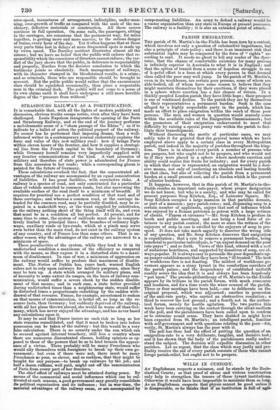STRASBOURG RA TLWAY AS A FORTIFICATION.
IT is remarkable that, with all the lights of modern publicity and discussion, obvious truths escape notice, even after they have been challenged. Louis Napoleon inaugurates the opening of the Paris and Strasbourg Railway, and at the end of the journey performs a melodramatic scene of a "sham passage of the Rhine "; as if to indicate by a ballet of action the political purport of the railway. No sooner has he performed that imposing , than a well- informed writer in a contemporary journal elaborately explains the force and value of this new military road: how it brings Paris within eleven hours of the frontier, and how it supplies a strategi- cal line from the French capital to the boundary of Germany ; while Germany herself remains very imperfectly supplied with any frontier communications of the kind. A vast accession of military and therefore of state power is adumbrated for France from this secession to her roads ; while a corresponding gloom is painted for the future of Germany.
These calculations overlook the fact, that the concentrated ad- vantages of the railway are accompanied by an equal concentration of liabilities. It has great facilities, with correlative risks. A railway is a species of road, not only constructed for a particular class of vehicle unsuited to common roads, but also narrowing the available surface of the road itself to a minimum of breadth. It requires for practical use a perfect condition of that road and of those carriages ; and whereas a common road, or the carriage in- tended for the common road, may be partially disabled, may be re- paired in a makeshift way, or the want supplied by substitutes, on the railway nothing short of the thing itself will do, and even that must be in a condition all but perfect. At present, and for some time to come, the system of railroads must also be compara- tively limited to principal lines ; the branches of ordinary high- ways, auxiliary roads or bye-roads, which at a pinch may serve even better than the main road, do not exist in the railway system of any country, and of France less than some others. That is an- other reason why the advantages of the railway are narrowed to a minimum of space. - These peculiarities of the system, while they lend to it in its undisturbed condition a maximum of the efficiency as compared with the means, so they expose it in a disturbed state to a maxi- mum of disablement. In ease of war, a minimum of aggression on the railway would suffice to produce that maximum of disable- ment. The Nation of Dublin has, years back, warned English rulers not to rely upon railways for military purposes, since they may be torn up. A state which arranged its military plans, and of necessity to some extent its usages, on the basis of railway com- munication, would suffer a severe check by the sudden disable- ment of that means; and in such ease, a state better provided during undisturbed times than a neighbouring state, would suffer in disturbed times a proportionate enfeebling by the sudden with- drawal of that resource. France, for example, accustomed to reckon on that means of communication, is better off, so long as the re- source lasts, than Germany ; but suddenly deprived of the railway, with all her plans thrown abroad, she would be worse off than Ger- many, which has never enjoyed the advantage, and has never based any calculations upon it. It may be said that France incurs no such risk so long as her state remains consolidated, and that it must be broken into before possession can be taken of the railway : but this would be a very false calculation. There is no ()pantry under the sun which can be secured against internal treachery, still less a country where there are numerous discontented classes, holding opinions so op- posed to those of the powers that be as to lend treason the appear- ance of a virtue. There probably will be many Frenchmen who would ally themselves with foreigners to break up their own go- vernment; but even if there were not, there must be many Frenchmen so poor, so clever, and so reckless, that they might be bought for any purpose—to break up railways by the job; and half a dozen ruffians, well paid, might cut off the communication of Paris from every part of her frontiers. The chief effect of railways must be attained during peace. By means of the commercial and social influences which can be cul- tivated at such seasons, a good government may greatly consolidate its political organization and its influence ; but in war-time, the material advantages of the railway cease, or are accompanied by compensating liabilities. An army to defend a railway would be a vaster organization than any state in Europe at present possesses. The railway is a facility ; it is also an extended point of attack.


























 Previous page
Previous page